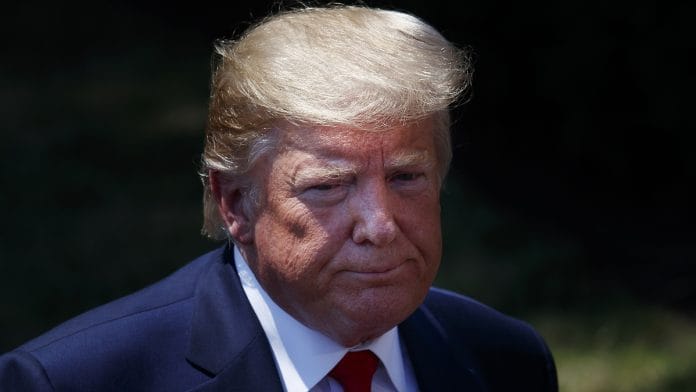Washington:President Donald Trump cast doubts over the likelihood of an anticipated trade deal with India on Tuesday, just days before a scheduled visit to the South Asian power.
”Well, we can have a trade deal with India, but I’m really saving the big deal for later on,” Trump told reporters as he left the White House for a trip to California.
Trump last year kicked India out of a program for developing countries that gave some Indian exports tariff-free access to the U.S. market. Officials from both sides since then have been trying to hammer out a modest agreement, which would open up India to American exports of agricultural products and medical devices in return for a restoration of India’s preferential status.
People familiar with the negotiations say they had been making progress until recent days, building expectations of an announcement during Trump’s Feb. 24-25 visit. But Robert Lighthizer, the U.S. trade representative, cancelled a planned visit to the country last week as the talks appeared to stall — as they had ahead of a visit to the U.S. last year by Narendra Modi, India’ prime minister.
Trump appeared to confirm that on Tuesday when he told reporters that he still wanted to do “a very big trade deal with India,” but added, “I don’t know if it will be done before the election.”
“We’re not treated very well by India, but I happen to like Prime Minister Modi a lot,” he added.
The negotiations have centred on U.S. demands for greater access to the Indian market sought by American makers of stents and other medical devices as well as dairy farmers — two constituencies that were behind the push that led to Trump’s decision last year to suspend India’s privileges under the Generalized System of Preferences program for developing countries.
Also read: When Trump visits, US and India must not get distracted by Pakistan & trade
Alfalfa Hay
India has offered greater market access for American farm products ranging from alfalfa hay to pecans and dried distillers grains. It also has offered to lower the duties on large engine Harley-Davidson Inc. motorcycles, a complaint frequently cited by Trump. In return, it has been seeking a restoration of its GSP privileges.
But people familiar with the discussions said that the talks had also been complicated by new tariffs introduced by both sides. India announced higher tariffs on medical devices and a range of other products in its Feb. 1 budget, angering the U.S. side. Meanwhile, a move by the Trump administration last month to extend tariffs on steel and aluminium to downstream products annoyed Indian officials.
The limited scope of the deal that was taking shape was annoying some in the U.S. business community because big concerns of theirs were not included in the potential agreement, including growing Indian restrictions on the flow of data, according to three people familiar with the plans.
A small deal may still come together in the coming days and could serve as a foundation for a more consequential long-term agreement. There are also likely to be consequences, however, if that doesn’t happen.
Also read: Trump and Modi meeting when India-US partnership is strained. And then there’s China
Trump’s Trip
Indian media last week quoted Alice Wells, the top U.S. diplomat focused on South Asia, as saying a failure to reach what she described as a “tiny phase one trade deal” with India ahead of Trump’s visit would be a “big setback.”
Alyssa Ayres, who served as deputy assistant secretary of state for South Asia during the Obama administration and is now at the Council on Foreign Relations, said a failure to announce anything on trade during next week’s visit by the U.S. president would be an embarrassment for both Trump and Modi.
It also, however, would be emblematic of the consequences of Trump’s tariff-driven trade policy, she said.
Successive U.S. administrations have struggled to get India to remove trade barriers. Trump’s tariffs on steel and other Indian exports have changed that conversation, however.
The U.S. for years pushed India to open up its economy and would invoke its own openness as an example. But Trump’s tariffs provoked India to respond in kind, Ayres said, and undermined the push for greater reforms in an India with volatile domestic politics and a history of politically-driven protectionism.
“India is a huge market that we were trying to nudge in another direction, and we are not even nudging anymore,’” Ayres said.
Nisha Biswal, president of the U.S.-India Business Council, said the fact that the U.S. and India were even having substantive discussions on trade should be seen as encouraging. “When trade becomes consequential, it becomes contentious. And the fact that trade is contentious is not a problem, it is a reflection that both sides see each other as a priority,” she said.
Biswal also warned, though, that the clock was ticking for the Trump administration’s efforts to get India to make meaningful concessions. “My fear is we lose the leverage that we have if we don’t get something done,” she said. – Bloomberg
Also read: Trump is considering a new wave of US tech export restrictions on China






